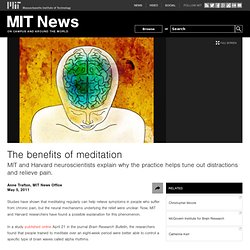

Psychology Research Control. Science Explores Meditation's Effect on the Brain. The benefits of meditation. Studies have shown that meditating regularly can help relieve symptoms in people who suffer from chronic pain, but the neural mechanisms underlying the relief were unclear.

Now, MIT and Harvard researchers have found a possible explanation for this phenomenon. In a study published online April 21 in the journal Brain Research Bulletin, the researchers found that people trained to meditate over an eight-week period were better able to control a specific type of brain waves called alpha rhythms. “These activity patterns are thought to minimize distractions, to diminish the likelihood stimuli will grab your attention,” says Christopher Moore, an MIT neuroscientist and senior author of the paper. TEDxBrownUniversity - Willoughby Britton - Why A Neuroscientist Would Study Meditation. Modern parenting may hinder brain development, research suggests. Social practices and cultural beliefs of modern life are preventing healthy brain and emotional development in children, according to an interdisciplinary body of research presented recently at a symposium at the University of Notre Dame.

"Life outcomes for American youth are worsening, especially in comparison to 50 years ago," says Darcia Narvaez, Notre Dame professor of psychology who specializes in moral development in children and how early life experiences can influence brain development. "Ill-advised practices and beliefs have become commonplace in our culture, such as the use of infant formula, the isolation of infants in their own rooms or the belief that responding too quickly to a fussing baby will 'spoil' it," Narvaez says. Evidence of 'God particle' found. The physics world was abuzz Monday with early reports that the elusive "God particle" had been detected at Europe's premier physics lab.

Discovering the particle, formally called the Higgs boson, would finalize physicists' understanding of how subatomic particles have mass, which gives an object weight. Two international physics teams at the European Organization for Nuclear Research, or CERN, in Geneva will present their results Wednesday. Their data should reveal a definitive signature that the particle exists as seen in the atom-smasher experiments at CERN.